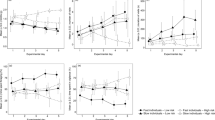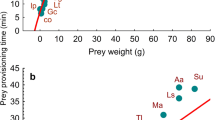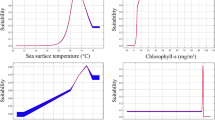Abstract
SMALL birds increase their fat reserves in winter as insurance against reduced or unpredictable food supplies1: fat is accumulated daily from feeding and utilized overnight2. Field observations indicate that birds often maintain smaller reserves than expected2, which implies that there is a cost of being fat3. One such cost could be that an increased fat load reduces manoeuvrability, thus increasing the risk of predation3,4. Here we demonstrate a link between fat reserves and predation risk by describing changes in body mass (roughly equivalent to fat reserves) that have occurred in British populations of the great tit, Parus major since 1950, a period when the numbers of its principal predator, the spar-rowhawk Accipiter nisus, changed markedly. Furthermore, these changes resulted from individual tits adjusting their mass, rather than from the selection of heavier great tits by hawks.
This is a preview of subscription content, access via your institution
Access options
Subscribe to this journal
Receive 51 print issues and online access
$199.00 per year
only $3.90 per issue
Buy this article
- Purchase on Springer Link
- Instant access to full article PDF
Prices may be subject to local taxes which are calculated during checkout
Similar content being viewed by others
References
Blem, C. R. Curr. Orn. 7, 59–114 (1990).
Gosler, A. G. J. Anim. Ecol. (in the press).
Witter, M. S. & Cuthill, I. C. Phil Trans. R. Soc. Lond. B 340, 73–92 (1993).
McNamara, J. M. & Houston, A. I. Acta biotheor. 38, 37–61 (1990).
Gosler, A. G. The Great Tit (Hamlyn, London, 1993).
Perrins, C. M. British Tits (Collins, London, 1979).
McCleery, R. H. & Perrins, C. M. in Bird Population Studies (eds Perrins, C. M., Lebreton, J.-D. & Hirons, G. J. M.) 129–147 (Oxford Univ. Press, 1991).
Newton, I. The Sparrowhawk (Poyser, Calton. 1986).
Newton, I. in The New Atlas of Breeding Birds In Britain ana Ireland: 1988–91 (eds Gibbons, D. W., Reid, J. B. & Chapman, R. A.) 110–111 (Poyser, London, 1993).
Gosler, A. G. Fritillary 1, 29–74 (1990).
Grey, I. thesis, Univ. Oxford (1987).
Svensson, L. Identification Guide to European Passerines (Naturhistoriska Riksmuseet, Stockholm. 1970).
Spencer, R. The Ringer's Manual (British Trust for Ornithology, Tring, 1965).
Gosler, A. G., Greenwood, J. J. D., Baker, J. K. & King, J. R. Ringing & Migration (in the press).
Garnett, M. C. thesis, Univ. Oxford (1976).
Gosler, A. G. Bird Study 38, 1–9 (1991).
Falconer, D. S. Introduction to Quantitative Genetics 2nd eds (Longman, London, 1981).
Gosler, A. G., J. Orn. Lpz. 135, 358 (1994).
Hinsley, S., Bellamy, P. E. & Moss, D. lbis 137, 418–420 (1995).
Ekman, J. Anim. Behav. 35, 445–452 (1987).
Ekman, J. & Lilliendahl, K. Behav. Ecol. 4, 232–238 (1993).
Author information
Authors and Affiliations
Rights and permissions
About this article
Cite this article
Gosler, A., Greenwood, J. & Perrins, C. Predation risk and the cost of being fat. Nature 377, 621–623 (1995). https://doi.org/10.1038/377621a0
Received:
Accepted:
Issue Date:
DOI: https://doi.org/10.1038/377621a0
This article is cited by
-
Effects of competition and predation operating at individual and population levels: an overview of results from a long-term field experiment
Oecologia (2023)
-
Reactive response to predation risk affects foraging time of hares, yet not their phosphorus intake
Mammalian Biology (2023)
-
Thermal adaptation best explains Bergmann’s and Allen’s Rules across ecologically diverse shorebirds
Nature Communications (2022)
-
Morphological differences along a chronological gradient of urbanisation in an endemic insectivorous bird of New Zealand
Urban Ecosystems (2022)
-
Which species discovers novel food sources first? A camera trap study in a natural environment
Avian Research (2021)
Comments
By submitting a comment you agree to abide by our Terms and Community Guidelines. If you find something abusive or that does not comply with our terms or guidelines please flag it as inappropriate.



